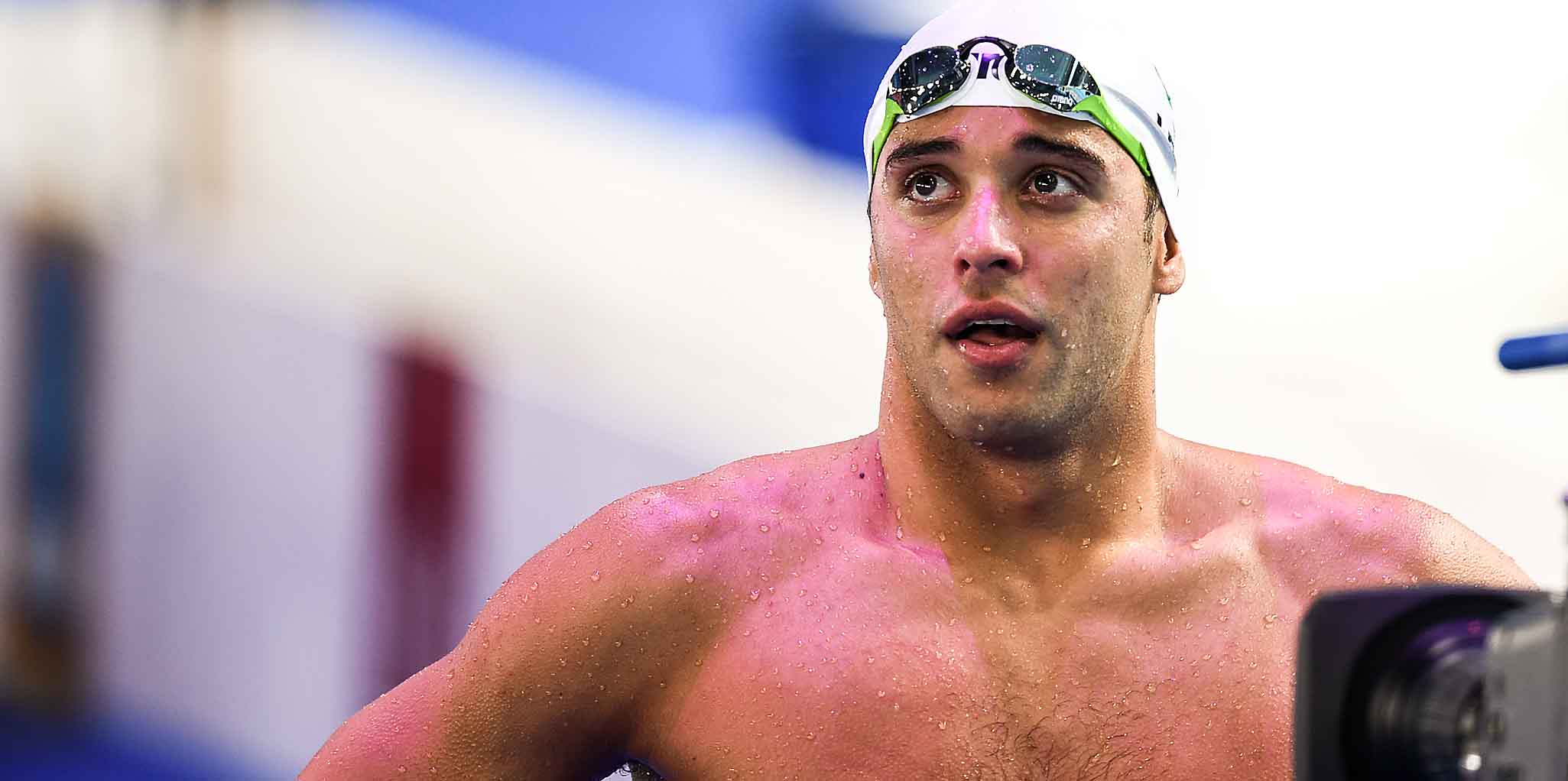Chad le Clos is back where he belongs: on top of the podium. The South African star swimmer is collecting medals again at the Commonwealth Games in Australia. Something he doesn’t take for granted since his bitter defeat at the 2016 Olympic Games. The key moment in overcoming his demons from Rio happened less than one year ago.
It was one of the most emotional situations of the 2017 World Championships in Budapest. In a neck and neck finish, le Clos secured the gold medal in the 200m butterfly defeating his friend and local hero Laszlo Cseh. Le Clos couldn’t hold back tears of joy after the race and at the award ceremony.
“It was an incredible atmosphere, I really needed that,” le Clos said a few days after the race at a lunch interview with Fastlane4 organized by his sponsor OMEGA. “After this week in Budapest, I was finally able to put the demons of the past behind me.”
It was apparent from the way he carried himself, le Clos was cheerful, relaxed and confident again. He had been forcing a smile ever since his performance at the 2016 Olympics in Rio de Janeiro where he took second place in the 100m butterfly and the 200m freestyle. However, in his main event, the 200m butterfly, the top athlete and defending champion begrudgingly took fourth place.
After coming home from Brazil with two medals and the disappointment of a fourth place, a celebration was waiting for le Clos as soon as he got off the plane. “It wasn’t easy,” he said. “I didn’t see myself as a winner at all. I just felt empty.” The defeat didn’t sit right with him. “I was so frustrated and disappointed in myself. I wasn’t happy for a long time after that.” So, le Clos looked for something new to inspire him.
The inspiration he found was Italian coach Andrea di Nino. Di Nino is known for coaching sprinters such as Andriy Govorov (Ukraine), two-time Olympian Evgeny Korotyshkin (Russia), and Michael Phelps’ long-time competitor Milorad Čavić (Serbia). They’ve been working together for about a year now. He was le Clos’ first choice for a new coach after splitting with his long-time coach Graham Hill.
“I’ve learned so much about swimming that I didn’t know before,” le Clos said about his new coach. “I’m actually learning starts and turns for the first time. I’d always just done that by feeling.”
“I’ve learned so much about swimming that I didn’t know before.”
They’ve also been working on his butterfly stroke. When le Clos was catapulted into international stardom with his Olympic victory over Michael Phelps about six years ago, many wondered how the youngster with his unusual way of swimming could be so fast.
While his competition elegantly carved through the water, le Clos seemed like he was plowing through it. His technique was noticeably different at the World Championships in 2017 and again at the Commonwealth Games 2018. “I’m swimming a lot flatter and more efficiently—that’s what it’s all about, efficiency,” le Clos said. “When you’re careful with your energy, then you can use it better.”
But there’s been another change: In Budapest, le Clos was looking straight ahead during his 200m race. In the past, le Clos would always shoot a glance at his competitors as he swam. He was more disciplined in Budapest and only looked over at his rival Laszlo Cseh during the last lap.
“I made a deal with my coach before the race: I get to look once on the third lap and twice during the last,” the swimmer said with a smile on his face. “But I ended up looking three times during the last lap.” He’s realized that his renewed success isn’t just because of the technique; it’s also due to his character. “It’s finally clear to me that it’s not about the fame or the money or the medals,” le Clos said. “It’s about being able to go to sleep at night with a clear conscience, totally content with your performance. For the first time in over a year, I can finally sleep again.”
“I don’t think I’m even close to the peak of my career, or of my personal development.”
Le Clos isn’t finished working on his technique or on himself. “I don’t think I’m even close to the peak of my career or of my personal development,” the 25-year-old said confidently. In spite of the emotional rollercoaster, he can’t get enough of swimming. The 2020 Olympics his next goal – but definitely not his last. “Just wait and see: I’m only just getting started,” he said. Judging from his performance at the Commonwealth Games in Australia, we certainly believe him.

